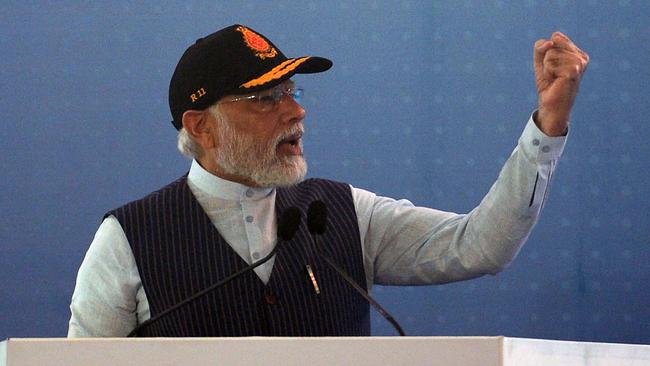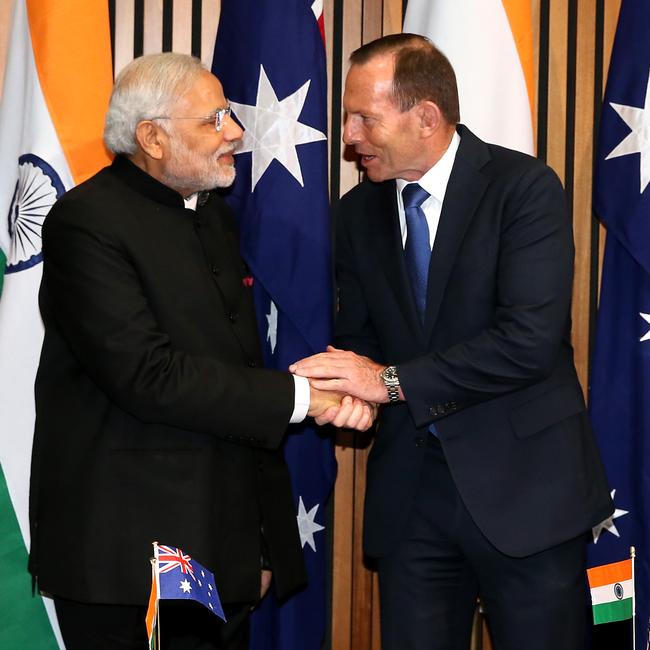
In 1990, more than 30 per cent of the world’s people lacked access to safe drinking water and lived in absolute poverty. By 2020, fewer than 10 per cent were so afflicted. And in the quarter century up to 2020, more wealth was created than in the previous 25,000 years. The world has been richer, safer, freer, fairer – and, yes, greener too – than ever, with a billion people moving from the Third World to the middle class in scarcely a generation.
Our task is to keep this momentum. Because history hasn’t ended: the pandemic, the Ukraine war and the deepening strategic shadow between the Middle Kingdom and all who won’t kowtow are unwelcome reminders that liberty and prosperity have to be earned rather than taken for granted.
This is where India is so important. The world’s largest democracy has endured partition, war, poverty and the wet blanket of low expectations, yet it is now the world’s fastest growing large economy and a bastion of the freedom that’s under sudden and unexpected challenge.
Remember Beijing’s threat to the Association of Southeast Asian Nations: “China is a big country and you are small countries and that is a fact.” In other words, the strong do what they will while the weak suffer what they must.

Having suffocated the “one country, two systems” freedom of Hong Kong, China’s next move is to conquer Taiwan on the Communist Party’s proclaimed path of avenging the “century of humiliation” and making China the world’s No.1 country by mid-century. Naturally, the commissars in Beijing are determined to crush liberal, pluralist, democratic Taiwan because it’s living, breathing proof that there’s no totalitarian gene in the Chinese DNA.
For war in East Asia to be avoided, and for life as we’ve known it not to be up-ended, the cost of aggression has to be raised: it can’t just be big China versus little Taiwan. China has to fear that Taiwan won’t be alone and that any attack might unleash a conflict it could lose.
That’s why the Quad is so important, this partnership between the US, India, Japan and Australia, based on shared values – without which the words of treaties and structures of alliance mean little. The Quad is not against anyone; it’s for a free and open Indo-Pacific where commerce is expanding, where people can move around and where countries’ sovereignty is respected.
After all, it was NATO that kept the peace in Europe for over 70 years, because it meant that small countries couldn’t be picked off by big ones. Does anyone think the Russian dictator would have dared to attack Ukraine had it been part of NATO? And if the peace is to be kept in the Indo-Pacific for generations to come, it will be the Quad that does it.
Many have supported the Quad but just two leaders made it happen: the late Shinzo Abe of Japan, because only a fellow Asian could have nudged India away from its longstanding non-alignment; and India’s Narendra Modi, because only a global statesman could have turned the Quad from a low-key meeting of officials to a regular leaders’ summit of the world’s first and third largest economies together with the world’s emerging democratic superpower.
I’m confident that, a couple of decades hence, India’s economy will surpass China’s because it has the priceless gifts of democracy, the rule of law and to a great extent English, the world’s common language, so it can be a country that’s creative and connected.
It’s sometimes said China is not an imperialist power. Say that to the Tibetans or to the Vietnamese, or to India, which has been attacked at least twice. India’s wars have all been defensive. One was to create a new nation, Bangladesh, out of the ashes of the old Pakistan. None of its neighbours fear India. Indeed, all look to it, especially Sri Lanka, as it wakes up from the madness of banning the most effective fertilisers.
Right now, some people who should know better are questioning the quality of India’s democracy, with Freedom House labelling it only “partially free” and Modi unfairly likened to Donald Trump.
Yet the test of a democracy is: “Can the government change?” and “Is the press free?”, and on that score India is a palpable success, with government routinely changing hands, despite the BJP’s current dominance, and a riotously free media.
Sure, India isn’t perfect – nowhere is – but at least when things go wrong there’s a judiciary to appeal to, plus a free media to speak truth to power.
It’s telling that just this week the global head of McKinseys has declared this would be not just an Indian decade but an Indian century because of the economic takeoff now under way. So if the 19th century was British and the 20th century American, a 21st century that’s Indian could help government to stay limited and the people to stay sovereign.
My strong instinct is that if there is to be a free world decades hence, it will be India that’s sustaining it. And if there’s to be a leader of the free world, why couldn’t it be the head of the world’s largest democracy, rather than just its richest?
This is an edited extract of a speech made by former prime minister Tony Abbott to the International Advertising Association in New Delhi on Monday.







The fall of the Berlin Wall and the collapse of Soviet communism were supposed to mark the final triumph of liberal capitalism. It certainly ushered in the best times in human history.